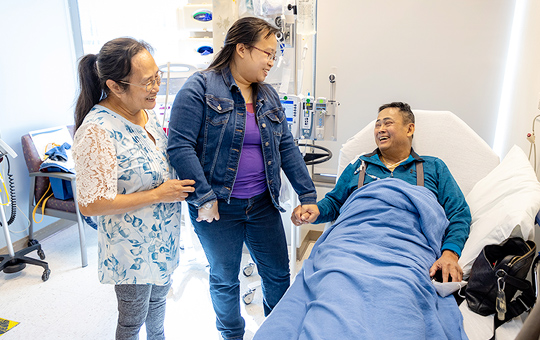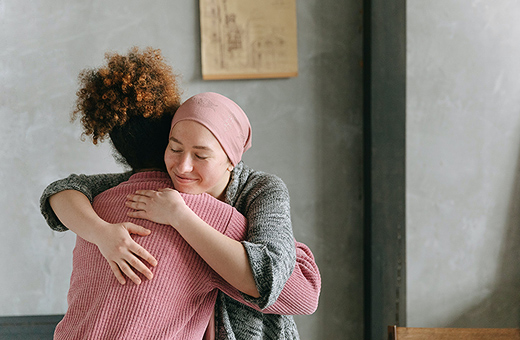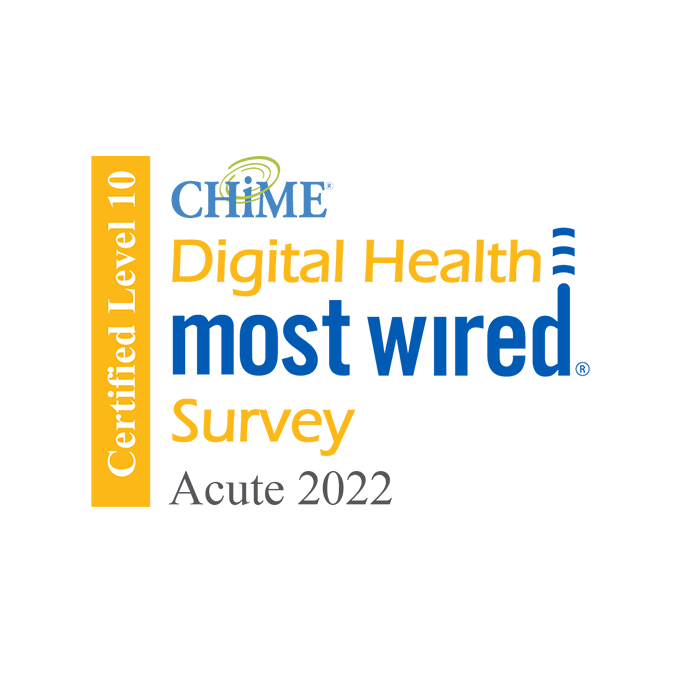Immunotherapy
We are leaders in using these innovative therapies to treat many different types of cancer.
Medically reviewed by Primo Lara, M.D. on Dec. 19, 2023.

Fighting Cancer With Your Immune System
Immunotherapy stimulates your own immune system to find and attack cancer cells. Scientific advances mean that new immunotherapy treatments are being studied and becoming available at a rapid pace.
At UC Davis Health, we use the latest approaches to treat cancer, including immunotherapy. Our highly skilled providers offer comprehensive and compassionate care.
How Immunotherapy Works
Immunotherapy uses your body’s immune system to defend against diseases, such as cancer. Your immune system, made up of white blood cells, organs and tissues, normally helps to keep your body healthy by fighting off disease. But cancer can get around your body’s natural defenses.
Immunotherapy works by helping your immune system to get rid of cancer cells, prevent the spread of cancer cells and slow or stop cancer cells’ growth. There are many different types of immunotherapy, including:
Cancer Vaccines
Vaccines boost your immune system’s response against cancer. We use cellular therapies to treat advanced prostate cancer and advanced melanoma skin cancer.
Checkpoint Inhibitors
Your immune system turns on your immune cells’ “checkpoint” protein to attack foreign cells. But cancer cells can trick checkpoint proteins to call off an attack. Checkpoint inhibitors help your immune system recognize and kill cancer cells. You get these drugs though an intravenous (IV) infusion.
Immunomodulators
These treatments increase your body’s response against cancer. One type of immunomodulator is cytokines, proteins which boost the activity or number of white blood cells. Another type is Bacilus Calmette-Guérin (BCG), a bacteria that treats bladder cancer. Lastly, there are immunomodulatory drugs, which stimulate your immune system.
Monoclonal Antibodies
These immune system proteins, created in the lab, help your immune system find and destroy cancer cells. You get these drugs through an intravenous (IV) infusion.
T-Cell Transfer Therapy
We take immune cells (T cells) from your blood. Then we grow more of these cells in the lab and return them to you through a needle in your vein. These T cells find and kill cancer cells. We may suggest T cell transfer therapy when other treatments haven’t been successful.
Request an Appointment
Our cancer specialists provide thorough evaluations and personalized treatment plans. Learn more about how to make an appointment at UC Davis Comprehensive Cancer Center.
Patients
New Patient Referral Office
916-734-5959
UC Davis Health Referring Physicians
For providers in UC Davis Medical Group or our Cancer Care Network
Physician Referral Center
916-734-5959
External Referring Physicians
For providers who are external clinicians
Referral Office
800-770-9261
You may get immunotherapy through an IV (infusion), take pills by mouth (oral immunotherapy) or use creams on your skin (topical immunotherapy). If you have infusions, they’ll often happen every 2, 3, 4 or 6 weeks. This gives your body time to rest and recover before the next treatment. You can prepare for your infusion by doing the following:
-

Bring a Loved One or Friend
You may want to ask a friend or family member (age 13 or older) to come with you, as we allow one visitor at a time. They can help keep you occupied and relaxed during your infusion.
-

Take Along a Snack and Entertainment
You may want to bring along a snack for infusions that last a few hours. Coming prepared with distractions to help you pass the time, such as an iPad or book, is also a good idea.
-

Wear Comfortable Clothes
Dressing in loose clothing can keep you comfortable if your infusion takes a while. You can also pack a warm blanket in case you feel cold during your infusion.
Immunotherapy Side Effects
Since immunotherapy revs up your immune system, it may also cause your immune cells to attack healthy tissue. This may lead to side effects during or after your treatment. We will help you figure out what to watch for and how to best treat any side effects. Common side effects related to immunotherapy may include:
Flu-Like Symptoms
You may have similar symptoms to those of the flu, such as chills, fatigue, fever, headaches and muscle aches.
Skin Reactions
You may have skin reactions where the needle went into your body. These symptoms can include itchiness, pain, redness and swelling.
Other Side Effects
Depending on the type of immunotherapy that you get, you may experience other adverse effects.
When to Contact Your Provider
Call your health care provider immediately if you think you’re having a serious allergic reaction to immunotherapy or if your side effects seem more serious than usual.

Ranked among the nation’s best hospitals
A U.S. News & World Report best hospital in cancer, cardiology, heart & vascular surgery, diabetes & endocrinology, ENT, geriatrics, neurology & neurosurgery, obstetrics & gynecology, and pulmonology & lung surgery.

Ranked among the nation’s best children’s hospitals
A U.S. News & World Report best children’s hospital in diabetes & endocrinology, nephrology, and orthopedics*. (*Together with Shriners Children’s)

Ranked Sacramento’s #1 hospital
Ranked Sacramento’s #1 hospital by U.S. News, and high-performing in COPD, colon cancer surgery, diabetes, heart attack, heart failure, hip fracture, hip replacement, kidney failure, leukemia, lymphoma & myeloma, lung cancer surgery, ovarian cancer surgery, pneumonia, prostate cancer surgery, stroke, TAVR, uterine cancer surgery, gastroenterology & GI surgery, and orthopedics.

The nation’s highest nursing honor
UC Davis Medical Center has received Magnet® recognition, the nation’s highest honor for nursing excellence.

“Most Wired” for acute care
UC Davis Health has been recognized as a level 10 out of 10 in the Digital Health “Most Wired” program from the College of Healthcare Information Management Executives (CHIME). The honor recognizes excellence in using technology to improve the delivery of care.

“Most Wired” for ambulatory care
UC Davis Health has been recognized as a level 10 out of 10 in the Digital Health “Most Wired” program from the College of Healthcare Information Management Executives (CHIME). The honor recognizes excellence in using technology to improve the delivery of care.

World-class cancer care
One of ~56 U.S. cancer centers designated “comprehensive” by the National Cancer Institute.

A leader in health care equality
For the 11th consecutive year, UC Davis Medical Center has been recognized as a “Leader in LGBTQ+ Healthcare Equality.”

